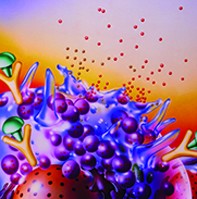Peer Reviewed
Feature Article Immunology and allergy
Allergic rhinitis: mimics and therapeutic options
Abstract
Several conditions may mimic the symptoms of allergic rhinitis and should be considered in the differential diagnosis. In those patients with severe disease, symptomatic treatments may be less cost-effective in the long term than allergen immunotherapy, the only form of treatment shown to alter the natural history of disease.
Key Points
- Asthma and allergic rhinitis frequently coexist, and treatment of allergic rhinitis can improve asthma control.
- Not all snuffly noses are due to allergy. Several conditions may mimic the symptoms of allergic rhinitis and should be considered in the differential diagnosis.
- Snuffly noses in infants are more commonly due to infection than allergy, are only occasionally due to allergy and are unrelated to dietary factors, even if coexistent food allergy is present.
- Allergy testing can help identify triggers to facilitate allergen avoidance and help design specific immunotherapy.
- The options for management of allergic rhinitis are the identification and avoidance of allergic triggers and medication to control symptoms but only specific allergen immunotherapy has the capacity to alter the natural history of disease.

